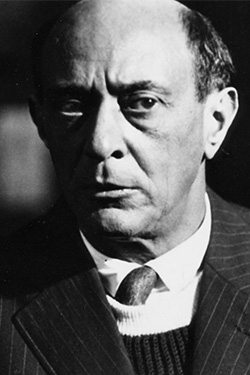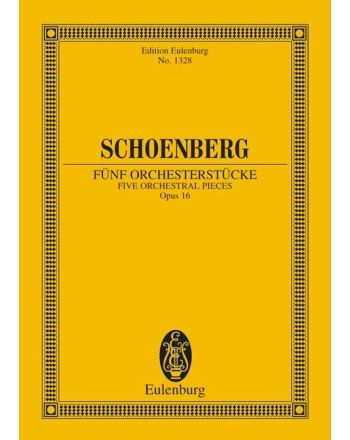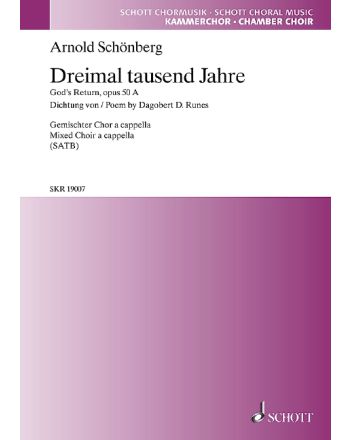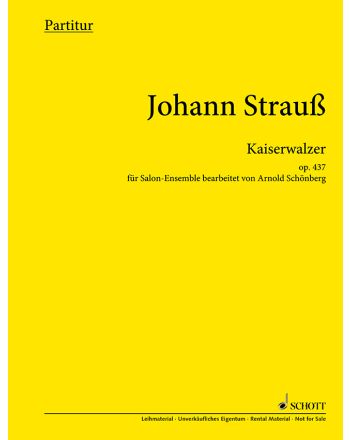
Arnold Schoenberg
Upcoming Performances
About Arnold Schoenberg
Arnold Schoenberg was born in Vienna on 13 September 1874 as son of the Jewish merchant Samuel Schoenberg and his wife Pauline. As early as 1882 he took his first violin lessons and made his first attempts at composing. After finishing school in 1890, he started to train as a clerk in a bank and worked for the private bank Werner & Co in Vienna until 1895. In 1894, being a member of the amateur orchestra ’Polyhymnia’, he met his future teacher and brother-in-law Alexander Zemlinsky. In the following years Schoenberg devoted himself mainly to composing and directing workers’ choirs. In 1901, upon recommendation of Richard Strauss, he got a job as musical director at the Berlin cabaret ’Überbrettl’ and in 1902 taught composition at the Stern Conservatoire. In 1903 he returned to Vienna where he set up as a composer and teacher of composition.Among the pupils he taught at the progressive ’Schwarzwald-Schule’ in Vienna, were Alban Berg and Anton Webern among others. In his ’Harmonielehre’ of 1911 Schoenberg digested his experience of teaching.
Apart from working as a composer, he also turned to painting from 1907. He contributed to the almanac ’Der blaue Reiter’ published by Wassily Kandinsky and Franz Marc. He was also successful in the field of music with performances of his melodrama cycle Pierrot lunaire Op. 21 (1912) and the world première of Gurrelieder (1913) in Vienna.
After scandal concerts with atonal works and futile attempts to get a university job, Schoenberg began to work again as teacher at the Stern Conservatoire in 1913. From 1915 to 1918 he was called up for military service. After World War I Schoenberg founded the Society for Private Musical Performances (1918-1921) the object of which was, above all, to give public rehearsals and performances of contemporary progressive music. In 1923 he publicly announced his twelve-note serial method of composition.
From 1925 Schoenberg took charge of the master class in composition at the Prussian Academy of Arts in Berlin, in succession to Ferruccio Busoni. During that time he was appointed honorary member of the Academia Santa Cecilia in Rome. In 1932 he finished the opera Moses and Aron.
In 1933, the year the National Socialists took over power, Schoenberg had to give up his post at the Berlin Academy. That year he emigrated to the USA via Paris and found a job as music teacher at the Malkin Conservatoire in Boston. From 1936 to 1944 he held a professorship in music in the University of California at Los Angeles. In 1941 he was granted American citizenship. In 1947 he was elected member of the American Academy of Arts and Letters, in 1949 the city of Vienna conferred the freedom of the city on him. Schoenberg died in Los Angeles on 13 July 1951.
Unlike any other composer of his time, Schoenberg initiated a radical change towards New Music. Nevertheless he always saw his works of the Second Viennese School as logical continuation of Western, particularly Austrian music tradition. As teacher of composition he shaped several generations of important musicians and composers. Since the 1950s the twelve-note technique developed by him has become the basis of serial composition techniques.
Please visit the website of the Arnold Schoenberg Center www.schoenberg.at
Worklist
Chronology
Alban Berg, Anton Webern and Egon Wellesz become pupils of Schönberg.
Exhibition of Schönberg’s paintings at the Heller Gallery in Vienna
Paintings of Schönberg are displayed in the exhibition "Der blaue Reiter" at the Thannhauser Gallery in Munich.
Schönberg completes the work on his "Harmonielehre".
Composes "Sechs kleine Klavierstücke" Op. 19
‘Skandalkonzert’ or ‘Watschenkonzert’ [Scandalous Concert] at the Vienna Concert Society with works by Schönberg and his pupils
Founds the Society for Private Musical Performances
Reconversion to the Jewish faith
Emigrates to the USA
Teaches at the Malkin Conservatoire in Boston and New York
John Cage takes private composition lessons with Schönberg.
Completes the work "Preliminary Exercises in Counterpoint"
World premiere of "Der Tanz um das Goldene Kalb" [The Dance Round the Golden Calf] from the fragmentary opera "Moses und Aron" in Darmstadt
Products
-
Ausgewählte SchriftenAuthor: Arnold SchoenbergEditor: Anna Maria MorazzoniMedia Type: Book with CDSeries: Musicology
Language: GermanProduct number: ED 9624Book + CDBook + CDIn stock€63.00Incl. Tax, Excl. Shipping -
Original VersionComposer: Arnold SchoenbergEdition: Study scoreSeries: Eulenburg Miniature Scores
Instrumentation: orchestraProduct number: ETP 1328Product TypeIn stockAs low as €10.99Incl. Tax -
Version for narrator, men’s chorus and piano trioMedia Type: Hire/performance materialEdition: Score and partsLanguage: Hebrew, EnglishHire/performance materialHire/performance material
-
for narrator, men's chorus and orchestraComposer: Arnold SchoenbergEditor: Josef Rufer | Christian Martin SchmidtMedia Type: Hire/performance materialEdition: Performance materialLanguage: Hebrew, EnglishHire/performance materialHire/performance material
-
for narrator, men's chorus and orchestraComposer: Arnold SchoenbergMedia Type: Sheet musicEdition: Study scoreSeries: A Survivor from Warsaw
Language: French, German, Hebrew, EnglishProduct number: BOE 19188Print editionPrint editionIn stock€15.95Incl. Tax, Excl. Shipping -
for narrator, men's chorus and orchestraComposer: Arnold SchoenbergEditor: Jacques-Louis MonodMedia Type: Hire/performance materialEdition: Performance materialLanguage: Hebrew, EnglishHire/performance materialHire/performance material
-
List of Published Works by SchottPromotional materialPromotional materialIn stock€0.00Incl. Tax, Excl. Shipping
-
Critical Report, FragmentsComposer: Arnold SchoenbergEditor: Martin Albrecht-Hohmaier | Ullrich ScheidelerMedia Type: Sheet musicEdition: Critical report, complete editionSeries: Arnold Schoenberg - Complete Works, Vol. 28
Language: German, EnglishProduct number: AS 1028-20Print editionPrint editionIn stock€206.85Incl. Tax, Excl. Shipping -
Composer: Arnold SchoenbergEditor: Ulrich KraemerMedia Type: Sheet musicEdition: Score, complete editionSeries: Arnold Schoenberg - Complete Works, Vol. 28
Language: German, EnglishProduct number: AS 1028-10Print editionPrint editionIn stock€198.25Incl. Tax, Excl. Shipping -
Composer: Arnold SchoenbergEditor: Tadeusz OkuljarMedia Type: Sheet musicEdition: Score, complete editionSeries: Arnold Schoenberg - Complete Works, Vol. 25
Instrumentation: orchestraProduct number: AS 1025-10Print editionPrint editionIn stock€204.00Incl. Tax, Excl. Shipping -
Critical Report, FragmentsComposer: Arnold SchoenbergEditor: Tadeusz Okuljar | Rudolf StephanMedia Type: BookEdition: Critical report, complete editionSeries: Arnold Schoenberg - Complete Works, Vol. 25/26
Product number: AS 1025-20BookBookIn stock€104.00Incl. Tax, Excl. Shipping -
Composer: Arnold SchoenbergEditor: Rudolf StephanMedia Type: Sheet musicEdition: Score, complete editionSeries: Arnold Schoenberg - Complete Works, Vol. 26
Instrumentation: orchestraProduct number: AS 1026-10Print editionPrint editionIn stock€150.00Incl. Tax, Excl. Shipping -
Composer: Arnold SchoenbergEditor: Ullrich ScheidelerMedia Type: Sheet musicEdition: Score, complete editionSeries: Arnold Schoenberg - Complete Works, Vol. 6,1
Language: GermanProduct number: AS 1006-10Print editionPrint editionIn stock€152.00Incl. Tax, Excl. Shipping -
Critical Report, Sketches, FragmentsComposer: Arnold SchoenbergEditor: Dorothee SchubelMedia Type: Sheet musicEdition: Critical report, complete editionSeries: Arnold Schoenberg - Complete Works, Vol. 22
Product number: AS 1022-20Print editionPrint editionIn stock€267.00Incl. Tax, Excl. Shipping -
Composer: Arnold SchoenbergEditor: Dorothee SchubelMedia Type: Sheet musicEdition: Score, complete editionSeries: Arnold Schoenberg - Complete Works, Vol. 22
Instrumentation: string sextet / wind quintetProduct number: AS 1022-10Print editionPrint editionIn stock€95.00Incl. Tax, Excl. Shipping -
Kritischer Bericht, Skizzen, Entstehungs- und Werkgeschichte, Dokumente, Anhang, Entwürfe und Fragmente (Teil 2: Suite op. 29, Phantasy op. 47)Composer: Arnold SchoenbergEditor: Ulrich Kraemer | Martina SichardtMedia Type: Sheet musicEdition: Critical report, complete editionSeries: Arnold Schoenberg - Complete Works, Vol. 23 B/2
Language: German, EnglishProduct number: AS 1023-22Print editionPrint editionIn stock€419.25Incl. Tax, Excl. Shipping -
Kritischer Bericht, Skizzen, Frühfassung des V. Satzes, Entstehungs- und Werkgeschichte, Dokumente (Teil 1: Serenade, op. 24)Composer: Arnold SchoenbergEditor: Ulrich KraemerMedia Type: Sheet musicEdition: Critical report, complete editionSeries: Arnold Schoenberg - Complete Works, Vol. 23 B/1
Language: German, EnglishProduct number: AS 1023-21Print editionPrint editionIn stock€385.00Incl. Tax, Excl. Shipping -
Composer: Arnold SchoenbergEditor: Ulrich Kraemer | Martina SichardtMedia Type: Sheet musicEdition: Score, complete editionSeries: Arnold Schoenberg - Complete Works, Vol. 23
Language: GermanProduct number: AS 1023-10Print editionPrint editionIn stock€198.25Incl. Tax, Excl. Shipping -
Fragments of choral works and canons, sketchesComposer: Arnold SchoenbergEditor: Tadeusz Okuljar | Martina SichardtMedia Type: Sheet musicEdition: complete editionSeries: Arnold Schoenberg - Complete Works, Vol. 18,3
Language: GermanProduct number: AS 1018-23Print editionPrint editionIn stock€141.00Incl. Tax, Excl. Shipping -
Part 2, SketchesComposer: Arnold SchoenbergEditor: Tadeusz Okuljar | Martina SichardtMedia Type: Sheet musicEdition: Critical report, complete editionSeries: Arnold Schoenberg - Complete Works, Vol. 18,2
Language: GermanProduct number: AS 1018-22Print editionPrint editionIn stock€239.00Incl. Tax, Excl. Shipping -
Composer: Arnold SchoenbergEditor: Tadeusz OkuljarMedia Type: Sheet musicEdition: Score, complete editionSeries: Arnold Schoenberg - Complete Works, Vol. 18
Instrumentation: mixed choir / men's choirLanguage: GermanProduct number: AS 1018-10Print editionPrint editionIn stock€161.00Incl. Tax, Excl. Shipping -
Critical report, sketches, fragmentsComposer: Arnold SchoenbergEditor: Christian Martin SchmidtMedia Type: Sheet musicEdition: Critical report, complete editionSeries: Arnold Schoenberg - Complete Works, Vol. 19
Language: GermanProduct number: AS 1019-20Print editionPrint editionIn stock€121.00Incl. Tax, Excl. Shipping -
Composer: Arnold SchoenbergEditor: Josef Rufer | Christian Martin SchmidtMedia Type: Sheet musicEdition: Score, complete editionSeries: Arnold Schoenberg - Complete Works, Vol. 19
A Survivor from Warsaw, Vol. 19
Instrumentation: mixed choir a cappellaLanguage: GermanProduct number: AS 1019-10Print editionPrint editionIn stock€141.00Incl. Tax, Excl. Shipping -
Part 1, SketchesComposer: Arnold SchoenbergEditor: Tadeusz Okuljar | Martina SichardtMedia Type: Sheet musicEdition: Critical report, complete editionSeries: Arnold Schoenberg - Complete Works, Vol. 18,1
Language: GermanProduct number: AS 1018-21Print editionPrint editionIn stock€138.00Incl. Tax, Excl. Shipping -
Kritischer Bericht, Skizzen, FragmenteComposer: Arnold SchoenbergEditor: Tadeusz OkuljarMedia Type: Sheet musicEdition: Critical report, complete editionSeries: Arnold Schoenberg - Complete Works, Vol. 15
Product number: AS 1015-20Print editionPrint editionIn stock€161.00Incl. Tax, Excl. Shipping -
Composer: Arnold SchoenbergEditor: Tadeusz OkuljarMedia Type: Sheet musicEdition: Score, complete editionSeries: Arnold Schoenberg - Complete Works, Vol. 15
Instrumentation: violin (piano) and orchestraProduct number: AS 1015-10Print editionPrint editionIn stock€204.00Incl. Tax, Excl. Shipping -
für Sprecher, vierstimmigen gemischten Chor und OrchesterComposer: Arnold SchoenbergMedia Type: Hire/performance materialEdition: Performance materialLanguage: GermanHire/performance materialHire/performance material
-
Kritischer Bericht, SkizzenComposer: Arnold SchoenbergEditor: Ullrich ScheidelerMedia Type: Sheet musicEdition: Critical report, complete editionSeries: Arnold Schoenberg - Complete Works, Vol. 6,3
Product number: AS 1006-32Print editionPrint editionIn stock€240.00Incl. Tax, Excl. Shipping -
Kritischer Bericht, DichtungComposer: Arnold SchoenbergEditor: Ulrich KraemerMedia Type: Sheet musicEdition: Critical report, complete editionSeries: Arnold Schoenberg - Complete Works, Vol. 17 B, Teil 1
Language: GermanProduct number: AS 1017-21Print editionPrint editionIn stock€322.50Incl. Tax, Excl. Shipping -
Oratorium (Fragment)Composer: Arnold SchoenbergEditor: Ulrich KraemerMedia Type: Sheet musicEdition: Score, complete editionSeries: Arnold Schoenberg - Complete Works, Vol. 17
Instrumentation: soloists, choirs and orchestraLanguage: German, EnglishProduct number: AS 1017-10Print editionPrint editionIn stock€110.00Incl. Tax, Excl. Shipping -
Oratorium (Fragment)Composer: Arnold SchoenbergEditor: Rudolf StephanMedia Type: Sheet musicEdition: Score, complete editionSeries: Arnold Schoenberg - Complete Works, Vol. 29
Instrumentation: 5 Soli, Chorus and Chamber orchestraLanguage: GermanProduct number: AS 1029-10Print editionPrint editionIn stock€138.00Incl. Tax, Excl. Shipping -
Earle Brown Contemporary Sound SeriesComposer: Pierre Boulez | Earle Brown | Niccolò Castiglioni | Aldo Clementi | Vittorio Fellegara | Milko Kelemen | Włodzimierz Kotoński | Bo Nilsson | Giacinto Scelsi | Arnold Schoenberg | Yuji Takahashi | Iannis Xenakis | Isang YunEditor: Earle BrownInterpreter: Guy Deplus | Lothar Faber | Severino Gazzelloni | Paul ZukofskyOrchestra/ensemble: Hamann Quartett | Hamburger Kammersolisten | Internationales Kranichsteiner Kammerensemble | New York String Quartet | Quartetto di Nuova Musica | Quatuor ParreninConductor: Bruno Maderna | Francis TravisMedia Type: 3 CDsProduct number: WER 69372CDCDIn stock€36.50Incl. Tax, Excl. Shipping
-
Kritischer Bericht, SkizzenComposer: Arnold SchoenbergEditor: Ullrich ScheidelerMedia Type: Sheet musicEdition: Critical report, complete editionSeries: Arnold Schoenberg - Complete Works, Vol. 6,2
Language: GermanProduct number: AS 1006-31Print editionPrint editionIn stock€225.00Incl. Tax, Excl. Shipping -
Composer: Arnold SchoenbergEditor: Ullrich ScheidelerMedia Type: Sheet musicEdition: Piano reduction, complete editionSeries: Arnold Schoenberg - Complete Works, Vol. 6,1
Language: GermanProduct number: AS 1006-20Print editionPrint editionIn stock€57.00Incl. Tax, Excl. Shipping -
studio reiheComposer: Arnold SchoenbergInterpreter: Helga PilarczykOrchestra/ensemble: Nordwestdeutsche PhilharmonieConductor: Karl ScherchenMedia Type: CDProduct number: WER 67702CDCDIn stock€18.50Incl. Tax, Excl. Shipping
-
nach Worten von Conrad Ferdinand Meyer, englische Übersetzung von Arthur FaggeComposer: Arnold SchoenbergMedia Type: Hire/performance materialEdition: Performance materialLanguage: German, EnglishHire/performance materialHire/performance material
-
Composer: Arnold SchoenbergNarrator: Jeanne Héricard | Derrik OhlsenConductor: Hans RosbaudOrchestra/ensemble: Southwest German Radio Symphony OrchestraMedia Type: CDProduct number: WER 64032CDCDIn stock€18.50Incl. Tax, Excl. Shipping
-
Composer: Arnold SchoenbergInterpreter: Heinrich SchiffConductor: Michael Gielen | Pavol ProchazkaNarrator: Guenter ReichOrchestra/ensemble: Southwest German Radio Symphony OrchestraMedia Type: CDProduct number: WER 60185-50CDCDIn stock€18.50Incl. Tax, Excl. Shipping
-
Poem by Dagobert D. RunesComposer: Arnold SchoenbergEdition: Choral scoreSeries: Schott Chamber Choir
Instrumentation: mixed choir (SATB)Product number: SKR 19007Product TypeIn stockAs low as €2.99Incl. Tax -
Composer: Johann Sebastian Bach | Ludwig van Beethoven | John Cage | Aaron Copland | Alan Hovhaness | Toshi Ichiyanagi | Arnold Schoenberg | Franz Schubert | Robert Schumann | Ben Weber | Stefan WolpeInterpreter: Grete SultanMedia Type: 4 CDsProduct number: WER 40432CDCDIn stock€39.50Incl. Tax, Excl. Shipping
-
Reproduktion des Autographs nach der Faksimileausgabe von 1912Composer: Arnold SchoenbergEditor: Ulrich KraemerMedia Type: Sheet musicEdition: complete editionSeries: Arnold Schoenberg - Complete Works, Vol. 16,2
Instrumentation: solo parts, choir and orchestraLanguage: GermanProduct number: AS 1016-11Print editionPrint editionIn stock€138.00Incl. Tax, Excl. Shipping -
Sketches - Early VersionsComposer: Arnold SchoenbergEditor: Ulrich KraemerMedia Type: Sheet musicEdition: Critical report, complete editionSeries: Arnold Schoenberg - Complete Works, Vol. 16,2
Language: GermanProduct number: AS 1016-22Print editionPrint editionIn stock€260.00Incl. Tax, Excl. Shipping -
Composer: Arnold SchoenbergEditor: Ulrich KraemerMedia Type: Sheet musicEdition: Critical report, complete editionSeries: Arnold Schoenberg - Complete Works, Vol. 16, 1
Language: GermanProduct number: AS 1016-21Print editionPrint editionIn stock€410.00Incl. Tax, Excl. Shipping -
Composer: Arnold SchoenbergEditor: Ulrich KraemerMedia Type: Sheet musicEdition: Score, complete editionSeries: Arnold Schoenberg - Complete Works, Vol. 16,1
Instrumentation: solo parts, choir and orchestraLanguage: GermanProduct number: AS 1016-10Print editionPrint editionIn stock€193.00Incl. Tax, Excl. Shipping -
History of the work and documentsComposer: Arnold SchoenbergEditor: Ulrich KraemerMedia Type: Sheet musicEdition: complete editionSeries: Arnold Schoenberg - Complete Works, Vol. 16, 3
Instrumentation: soloists, choir and orchestraLanguage: GermanProduct number: AS 1016-23Print editionPrint editionIn stock€258.00Incl. Tax, Excl. Shipping -
Critical Report, SketchesComposer: Arnold SchoenbergEditor: Nikos KokkinisMedia Type: Sheet musicEdition: Critical report, complete editionSeries: Arnold Schoenberg - Complete Works, Vol. 27,2
Product number: AS 1027-22Print editionPrint editionIn stock€170.00Incl. Tax, Excl. Shipping -
Ausgaben für Violoncello und Klavierbegleitung; KadenzenComposer: Arnold SchoenbergEditor: Nikos KokkinisMedia Type: Sheet musicEdition: Piano reduction with solo part, complete editionSeries: Arnold Schoenberg - Complete Works, Vol. 27,1
Product number: AS 1027-21Print editionPrint editionIn stock€60.00Incl. Tax, Excl. Shipping -
Composer: Arnold SchoenbergEditor: Nikos KokkinisMedia Type: Sheet musicEdition: Score, complete editionSeries: Arnold Schoenberg - Complete Works, Vol. 27
Product number: AS 1027-10Print editionPrint editionIn stock€167.00Incl. Tax, Excl. Shipping -
Sketches · Fragmentary short copy of the score (revision 1944) · History of creation and work · Documents Appendix: Draft for a stage work based on Balzac's Seraphita · Drafts for a symphonyComposer: Arnold SchoenbergEditor: Ulrich KraemerMedia Type: Sheet musicEdition: Critical report, complete editionSeries: Arnold Schoenberg - Complete Works, Vol. 17, Teil 2
Language: German, EnglishProduct number: AS 1017-22Print editionPrint editionIn stock€341.50Incl. Tax, Excl. Shipping -
von Johann Strauß, op. 437Composer: Arnold Schoenberg | Johann Strauß (Son)Arranger: Arnold SchoenbergMedia Type: Hire/performance materialEdition: Performance materialHire/performance materialHire/performance material














































